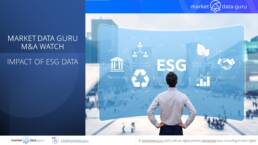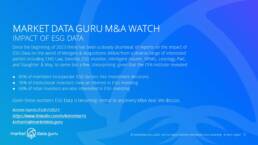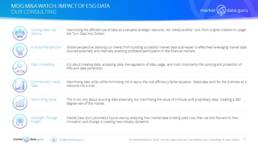

ESG AS PART OF THE DEAL STRATEGY
ESG is all about exposure to risk which comes in many forms, reputational, political, legal, meeting community expectations, all of which end up having a financial implication. What makes it harder is not only the continuing lack of global standards for ESG, albeit the UN, EU, and California are taking leading stances, but that perception can change, what was acceptable a mere 5 years ago, might be frowned upon now. It is an activists’ environment which is fragmented in terms of regulation, legislation, and associated provision of ESG data services.
The result is a tectonic shift from an awareness of ESG issues to active due diligence in assessing their impacts on a deal to ensure there are no skeletons in closets that could result in post M&A ramifications. ESG considerations are now an intrinsic part of the M&A process.
This inevitably adds a whole new data layer to researching and analysing any transaction for the deal parties, their financial advisors, plus associated legal and accounting teams. Sitting behind them are a company’s shareholders, the asset managers, private equity businesses and retail investors.
Both buyers and sellers have a vested interest:
- Buyers do not want to discover expensive liabilities
- Sellers want to maximise the price
This requires having access to a comprehensive range of data that is rarely found in one place or from one source that includes:
1.Access to corporate documentation
2.Evaluation of deal parties’ ESG policies, initiatives, their compliance models and processes
3.The data and information to support the due diligence of 1 & 2
MOTIVATION: ESG DATA AS A REVENUE GENERATOR
In a recent report KBV Research calculates the ESG Reporting Software market to reach $1.8 Billion by 2028, while unpublished estimates have this years’ market size for ESG Data at +/-$2 Billion. It is telling that evaluating ESG Data spend this year is proving problematic because of how many large suppliers are defining what it is, and also smaller suppliers are unwilling to share revenue information.
What we have seen is:
- An explosion in the number of ESG data providers (Market Data Guru lists around 400) of varying quality ranging from those demonstrating best practice to opaque vapourware suppliers, especially for ESG Ratings, which is somewhat ironic given the subject matter
- ESG Data suppliers themselves becoming the centre of MA& activity as traditional data vendors target the segment, with notable deals including ICE/Urgentem, Deutsche Börse/ISS (81%-$1.8 Billion), Morningstar/Sustainalytics (O/S 60% – $60 Million), MSCI/Carbon Delta, MSCI/GMI Ratings, Moodys/Vigeo Eris, Moodys/FourTwentySeven, to name just a few
We must also not forget the impact of social media. Sentiment data is playing an increasing role in driving perception, too often without any consideration of facts, and that in itself feeding back into ESG analysis.
SUMMARY
PwC’s most recent global investor survey noted two thirds of investors want sustainability reporting on a company’s impact on the environment and society, and its associated financial implications. Perhaps altruism is the not the driving principle, more enlightened self-interest.
As noted many quality and larger ESG Data Suppliers have already been subsumed into the large vendors and exchanges. MDG does not expect large scale ESG Data M&A activity in the short term, rather nuanced purchases where the aggregators want to either add scale or bolt on complimentary businesses to their existing ones.
Talk to us about our consulting services to see how we can help your business
Keiren Harris 05 July 2023
For information on our consulting services please email knharris@marketdata.guru
www.marketdata.guru/data-compliance
Please contact info@marketdata.guru for a pdf copy of the article
#marketdata #referencedata #esgdata #assetmanagers #M&A #analytics #ESG #Altdata #investors


